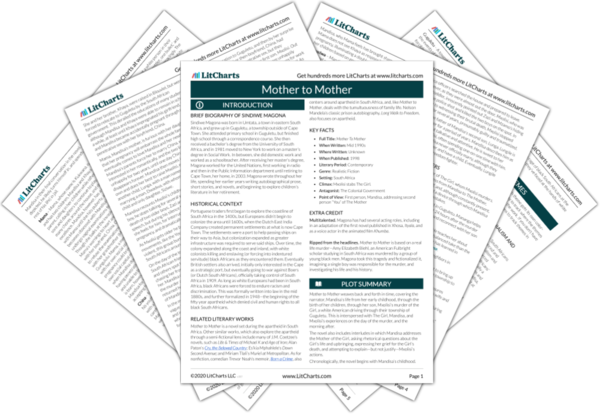Tata Quotes in Mother to Mother
Standard Six and, come year’s end, would sit for external examinations. A not insignificant step, as Mama reminded me daily: Gone is the time for playing.
Mama had high hopes for me ... for both of us, my brother and me. Our parents believed that education would free us from the slavery that was their lot as uneducated labourers.
Yes, we had our plans. But the year had its plans too; unbeknown to us, of course.

Unlock explanations and citation info for this and every other Mother to Mother quote.
Plus so much more...
Get LitCharts A+There is knowledge with which I was born — or which I acquired at such an early age it is as though it was there the moment I came to know myself ... to know that I was. We sucked it from our mothers’ breasts, at the very least; inhaled it from the very air, for most.
Long before I went to school I knew when Tata had had a hard day at work. He would grumble, “Those dogs I work for!” and fuss about, and take long swigs from the bottle.
Mama’s own quarrel with bosses often came on the day when Tata got paid. For some reason, her dissatisfaction with Tata’s conditions of employment seemed to deepen on Fridays.
I remember when, one Friday, she exploded:
“Sesilamba nje, beb’ umhlaba wethu abelungu! We have come thus to hunger, for white people stole our land.” […] Later, I was to hear those words with growing frequency. “White people stole our land. They stole our herds. We have no cattle today, and the people who came here without any have worlds of farms, overflowing with fattest cattle”

Tata Quotes in Mother to Mother
Standard Six and, come year’s end, would sit for external examinations. A not insignificant step, as Mama reminded me daily: Gone is the time for playing.
Mama had high hopes for me ... for both of us, my brother and me. Our parents believed that education would free us from the slavery that was their lot as uneducated labourers.
Yes, we had our plans. But the year had its plans too; unbeknown to us, of course.

Unlock explanations and citation info for this and every other Mother to Mother quote.
Plus so much more...
Get LitCharts A+There is knowledge with which I was born — or which I acquired at such an early age it is as though it was there the moment I came to know myself ... to know that I was. We sucked it from our mothers’ breasts, at the very least; inhaled it from the very air, for most.
Long before I went to school I knew when Tata had had a hard day at work. He would grumble, “Those dogs I work for!” and fuss about, and take long swigs from the bottle.
Mama’s own quarrel with bosses often came on the day when Tata got paid. For some reason, her dissatisfaction with Tata’s conditions of employment seemed to deepen on Fridays.
I remember when, one Friday, she exploded:
“Sesilamba nje, beb’ umhlaba wethu abelungu! We have come thus to hunger, for white people stole our land.” […] Later, I was to hear those words with growing frequency. “White people stole our land. They stole our herds. We have no cattle today, and the people who came here without any have worlds of farms, overflowing with fattest cattle”











